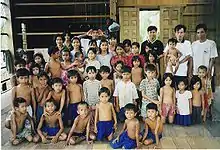child
Anglais
Étymologie
- Du l’anglo-saxon ċild.
Nom commun
| Singulier | Pluriel |
|---|---|
| child \ˈtʃaɪld\ |
children \ˈtʃɪl.dɹən\ |

Khmer children.
child \ˈtʃaɪld\
- Enfant (fils ou fille). Note d’usage : Utilisé généralement dans une construction possessive.
- I have two children.
- Enfant (être humain jeune).
- […] the child, by reason of his physical and mental immaturity, needs special safeguards and care, including appropriate legal protection, before as well as after birth, […]. — (Declaration of the Rights of the Child, 1959)
- […] l’enfant, en raison de son manque de maturité physique et intellectuelle, a besoin d’une protection spéciale et de soins spéciaux, notamment d’une protection juridique appropriée, avant comme après la naissance, […].
- […] the child, by reason of his physical and mental immaturity, needs special safeguards and care, including appropriate legal protection, before as well as after birth, […]. — (Declaration of the Rights of the Child, 1959)
- (Informatique) Objet appartenant ou dérivant d’un autre objet.
- The child node then stores the actual data of the parent node.
- Le nœud enfant contient ainsi les données actuelles du nœud parent.
- The child node then stores the actual data of the parent node.
Antonymes
Dérivés
- childhood (enfance)
- childish (enfantin, puéril)
- childlike (enfantin, innocent)
- child’s play (jeu d’enfant)
- grandchild (petit-enfant)
- love child
- manchild
- only child
- problem child
- schoolchild
- with child
Proverbes et phrases toutes faites
- spare the rod and spoil the child (qui aime bien, châtie bien)
Prononciation
Voir aussi
- child sur l’encyclopédie Wikipédia (en anglais)

Cet article est issu de Wiktionary. Le texte est sous licence Creative Commons - Attribution - Partage dans les Mêmes. Des conditions supplémentaires peuvent s'appliquer aux fichiers multimédias.